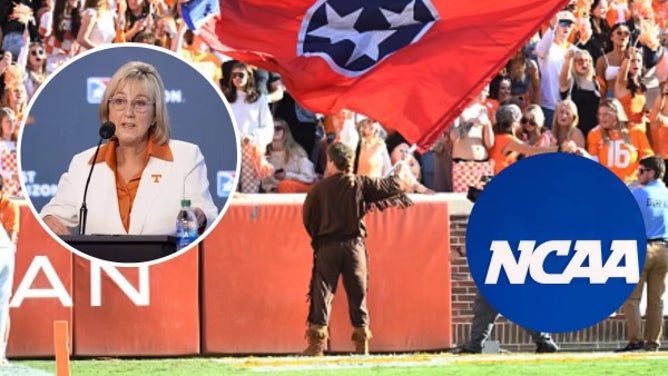U.S. Senators Reintroduce Bill That Aims To Change NCAA Investigation And Infractions Protocol
Two U.S. Senators are reintroducing a bipartisan bill that would establish guidelines for how the NCAA handles its infractions and investigative process. The ‘Accountability Act’ was first brought forth in 2022 by senators Marsha Blackburn (R-Tenn.) and Cory Booker (D-N.J.), who decided to reintroduce the bill during a chaotic time in college athletics.
As we have seen over the last few years, congress has held multiple hearings on the current state of the NCAA, including how the organization handles its investigative process. Now, with a new term in congress, both Blackburn and Booker have decided to submit their bipartisan bill once again.
The bill will be reintroduced to the senate, which aims to "establish due process protections for student-athletes, coaches, and universities that are under investigation by the NCAA for rule violations".

There is also the timing of this bill, with the ongoing investigation into Tennessee, along with the antitrust lawsuit filed last week against the NCAA by the attorneys general from Virginia and Tennessee.
"This comes as the states of Tennessee and Virginia have filed an antitrust case against the NCAA pertaining to name, image, likeness (NIL) after the organization opened an investigation into the University of Tennessee," a statement to OutKick noted.
Most notably, over the years, the NCAA's enforcement of violations can take a long period of time to either find wrongdoing or penalize a university. Some investigations take up to 5 years, which has been a catalyst for pushback from those being investigated. Under this bill, the NCAA would have deadlines for investigations, while also introducing a new way to appeal certain rulings.
"If the covered athletic association initiates an investigation into a member institution, the covered athletic association shall provide written notice to the member institution detailing the nature of the inquiry by not later than 60 days after the covered athletic association receives information indicating that a bylaw violation may have occurred, and that the covered athletic association has determined that an investigation is warranted."
Under this new bill, it would require the NCAA to complete an investigation within a one year period of time from when the school first receives a notice of investigation. Also, the NCAA would not be able to investigate alleged violations that occurred more than two years before the actual notice was sent to the school. This means the NCAA cannot retroactively tack-on penalties to the existing case outside this time window.
"The NCAA’s history of backroom deliberations that produce unfair punishments for athletes, coaches, and universities has gone on long enough," said Senator Blackburn. "Student athletes work their entire lives to compete on the college stage, and we must ensure that they are properly compensated for their talents, not bogged down with frustrating investigations with an organization that continues to move the goal posts. The NCAA Accountability Act brings much-needed consistency and transparency to the NCAA, ensuring that everyone is operating under the same set of expectations for rule violations."
Also, the NCAA would be required to report to the U.S. Attorney General, along with each state Attorney General, annually to make sure the NCAA is following the protocol set forth in the new legislation. In addition, the NCAA would not be able to use confidential sources as evidence or have it sway the decision of the investigative committee.
To view the entire Accountability Act Bill, click the link below.
Key Points To Reintroduced NCAA Accountability Act
Some of the key points of emphasis of this act center around member institutions being able to resolve any disputes regarding an investigation through arbitration.
- Requires the NCAA to conduct its enforcement proceedings and investigations in a fair and consistent manner. The penalties issued against member institutions for bylaw infractions shall be equitable with respect to severity of the infraction.
- Authorizes the DOJ, through an administrative law judge, to fine the NCAA or individuals on staff (up to $15,000,000) for violating the provisions of this bill.
- Authorizes the DOJ to order the removal of any member on the NCAA’s board of governors.
- Prohibits the NCAA from publicly disclosing information relating to an ongoing investigation until formal charges are filed in the notice of allegations.
"This legislation will increase fairness and transparency in the NCAA’s system for investigating potential rule violations," Senator Corey Booker released to OutKick. "It will ensure that college athletes and schools are given the clarity, consistency, and strong due process protections they deserve.
The final point of emphasis in this bill centers around the NCAA leaking parts of an investigation to the public while an inquiry is ongoing. As we witnessed this past week with the NCAA investigation into Tennessee athletics, along with past inquiries, some scenarios have led to schools having to fight the organization in the court of public opinion.
Now, this all comes at the perfect time for both senators, with the NCAA facing major push-back from member institutions, along with leaders across college campuses. There seems to be a willingness to bring the NCAA into congressional hearings and attack them in a public forum, but actually getting anything done on a federal level is a whole different story.
This is the latest attempt at putting the NCAA on notice, while also striking with the iron still hot. Will anything come of this down the road? It's hard to say at this point, but this latest legislation is another attempt at trying to hold those like Charlie Baker accountable for the mess that is the NCAA investigative process.